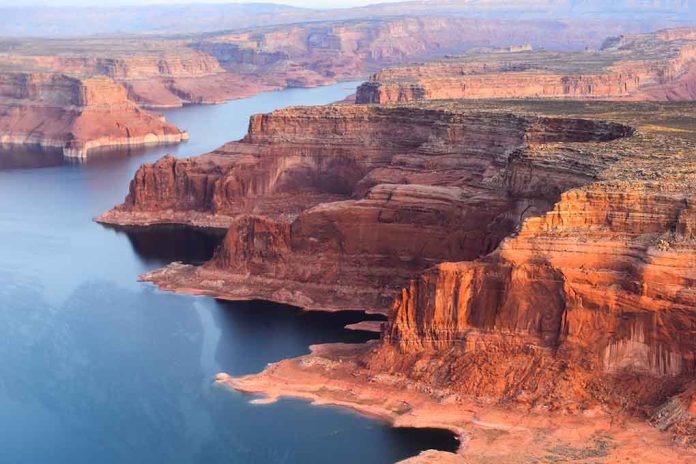
Navajo Nation has strengthened its uranium transportation laws, sparking debate over environmental protection and tribal sovereignty.
At a Glance
- Navajo Nation approved emergency legislation to strengthen tribal law regulating radioactive material transport
- The action responds to the revival of uranium mining near the Grand Canyon
- New law mandates advance notification, transport fees, and emergency preparedness plans
- Navajo President Buu Nygren signed the legislation, emphasizing protection of tribal lands and resources
Strengthening Tribal Laws for Environmental Protection
The Navajo Nation has taken decisive action to bolster its tribal laws governing the transportation of uranium across its lands. This move comes in response to growing environmental and health concerns, particularly following the revival of uranium mining operations near the Grand Canyon. The emergency legislation, approved by tribal lawmakers and signed by Navajo President Buu Nygren, aims to provide robust regulation and oversight of uranium transit through Navajo territory.
President Nygren emphasized the importance of this legislation in a letter to lawmakers, stating, “The purpose of this legislation is to provide for the protection, health and safety of the Navajo Nation and its people and our precious resources such as our water.” This statement underscores the tribe’s commitment to safeguarding its community and natural resources from potential harm associated with uranium transportation.
Key Provisions of the New Legislation
The updated law introduces several crucial requirements for companies transporting uranium ore through Navajo lands. These include mandatory advance notification of uranium ore shipments, payment of transport fees, and the filing of comprehensive emergency preparedness plans. These measures aim to enhance safety standards and ensure that tribal authorities are fully informed and prepared for any potential incidents.
“At the end of the day, we want Navajo leadership and Navajo citizens to be comfortable with modern uranium ore transport and to understand that it poses no risk to human health or the environment,” said Curtis Moore, a company spokesman. “And, we are willing to go above-and-beyond applicable federal and state laws to make that happen.”
Historical Context and Future Implications
The Navajo Nation’s history with uranium mining is complex and fraught with environmental and health concerns. In 2005, the tribe banned uranium mining on its lands due to widespread contamination and health issues resulting from past mining activities. However, the transportation of uranium was not prohibited in 2012, leading to the current situation where ore can be transported through Navajo territory.
Navajo Attorney General Ethel Branch highlighted the significance of this new legislation, stating, “That’s part of why the (Navajo) Nation needed to respond so strongly here, to push back and ensure that our community doesn’t continue to get disproportionately burdened with radiation and uranium-based waste and contamination.” This statement reflects the tribe’s determination to prevent further environmental degradation and protect public health.
Balancing Economic Interests and Environmental Concerns
The strengthening of uranium transportation laws by the Navajo Nation highlights the ongoing challenge of balancing economic interests with environmental and public health concerns. While uranium mining and transportation can provide economic opportunities, the Navajo Nation’s history of environmental contamination from past mining activities has made the tribe cautious and proactive in its approach to regulating these activities.
Energy Fuels Inc., the company involved in the uranium mining near the Grand Canyon, has expressed willingness to work with the Navajo Nation to address concerns and exceed federal and state safety standards. This cooperative approach may serve as a model for future interactions between Native American tribes and resource extraction companies, emphasizing the importance of dialogue, transparency, and mutual respect in addressing complex environmental and economic issues.
2012 Radiation Materials Transportation Act is strengthened in a new legislation signed into law
WINDOW ROCK, Ariz. – In 2012, former Navajo Nation President Ben Shelly signed into law a ban on uranium transportation.
Twelve years later, President Buu Nygyren worked alongside… pic.twitter.com/NJZskIll1B
— Navajo Nation President Buu Nygren (@BuuVanNygren) August 30, 2024
As the Navajo Nation continues to grapple with the legacy of past uranium mining and the current challenges of regulating its transportation, this new legislation represents a significant step towards asserting tribal sovereignty and protecting the health and well-being of its people and lands. The success of these measures will likely be closely watched by other Native American tribes and environmental advocates across the country.







